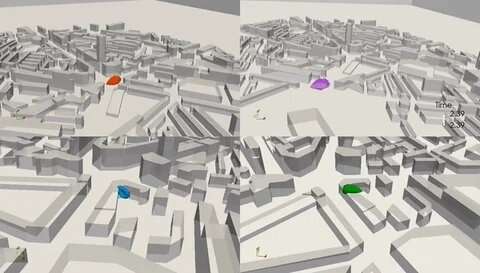Study to provide new insights into health impact of urban pollution

Londoners equipped with wearable sensors will help researchers understand the effects of air pollution on personal health in real time.
Air pollution is one of the world's greatest environmental threats, responsible for an estimated 7 million deaths every year. A new study, led by Imperial College London with partners at the University of Surrey and the University of Edinburgh, will provide the most detailed account yet of the specific personal health consequences of exposure to different air pollutants in urban environments.
Participants from around the capital, including at Imperial College London's South Kensington and White City Campuses, will wear individual pollution monitors as well as biosensors to track in real time how their heart and lung function responds to changing pollution in their environment, alongside their physical activity.
The study will involve healthy participants as well as those with asthma, to understand a range of sensitivities and responses to pollution.
Urgent questions
The INHALE study will develop a physics-based, multi-scale approach to understanding the impact of pollution in cities. This means looking at its effects at several levels in the human body—from our cells to our lungs, as well as how pollution moves around our cities and is affected by our immediate environment. By integrating these models, the researchers hope to develop a clearer picture of how individual people in cities can protect themselves from the harmful effects of air pollution, as well as how urban planning such as "green infrastructure"—such as roadside hedges and city vegetation—could be used to mitigate it.

The study is led by Professor Kian Fan Chung—a clinical scientist specialising in respiratory medicine from Imperial's National Heart and Lung Institute, and Professor Christopher Pain, who leads Imperial's Applied Modelling and Computation Group in the Department of Earth Sciences and Engineering.
Professor Kian Fan Chung said: "The health effects of air pollution have until now been measured in terms of excess mortality or admissions to hospital, but an assessment of effects of environmental pollution at the level of a particular individual is an area that has not yet been fully developed. INHALE will use complex modeling to predict the health outcomes at the personal level from a study of the biological potential of pollution particles through to the individual's respiratory response and his/her personal exposure in the neighborhood scale."

Professor Christopher Pain said: "This research addresses one of the most urgent questions our society faces—how can we live healthily and sustainably in our growing cities. We all love green infrastructure, but it is important to choose what and where to place it carefully. This study will help us understand how we can protect people from pollution in cities, while empowering them to personally devise ways of minimizing the effects of pollution on their health."
More information: D. K. Arvind et al. Characterisation of Breathing and Physical Activity Patterns in the General Population Using the Wearable Respeck Monitor, Body Area Networks: Smart IoT and Big Data for Intelligent Health Management (2019). DOI: 10.1007/978-3-030-34833-5_6

















